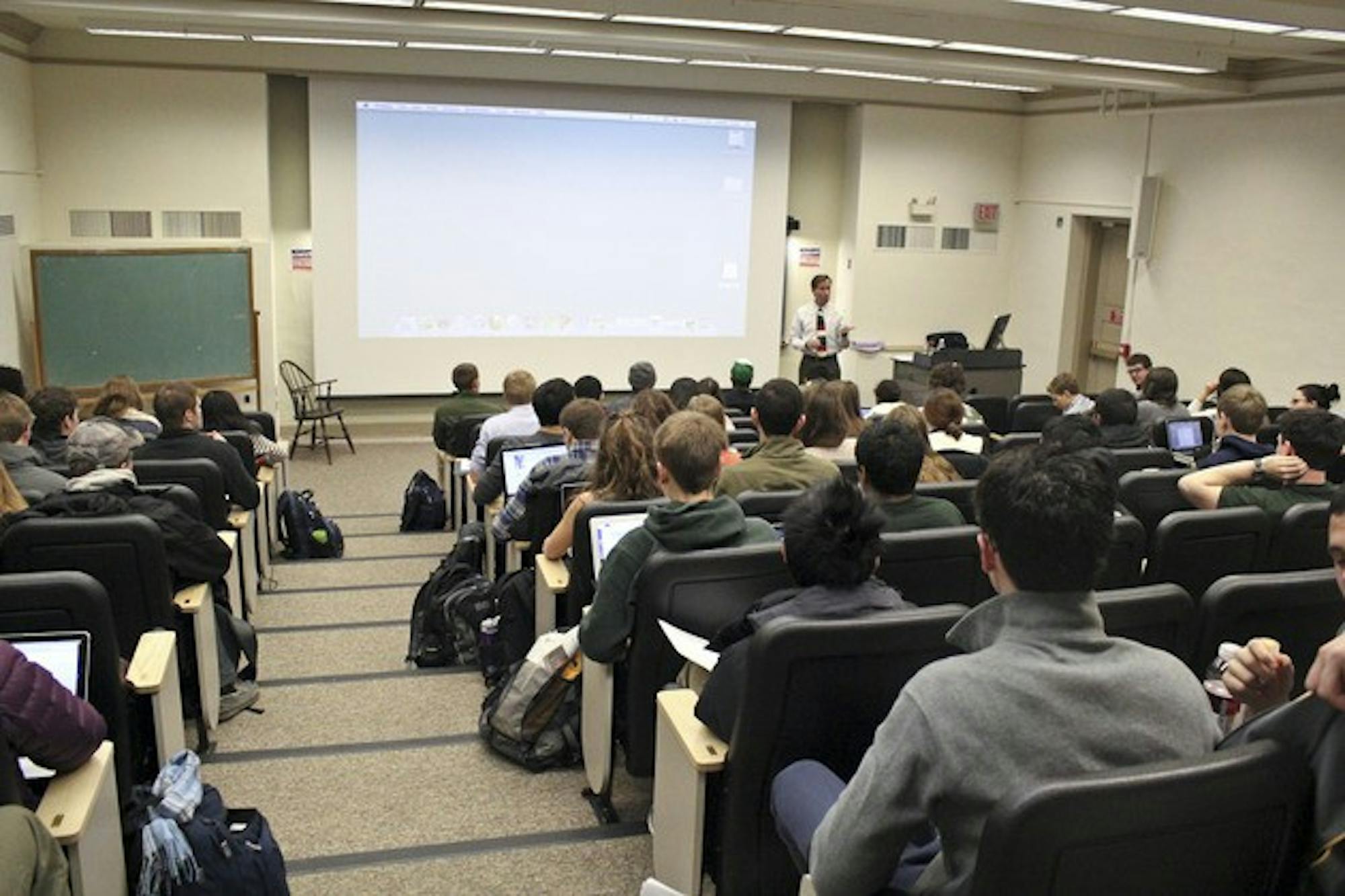Around 50 students are involved with the program and work on approximately 20 research projects, Shaiko said. The Vermont and New Hampshire legislatures ask group members to research specific policy-related topics. When their research is complete, students testify before the state legislatures and objectively present their findings, Shaiko said.
The Policy Research Shop was founded in the 2004-2005 academic year and has since received $1 million in funding, including a $750,000 grant from the U.S. Department of Education that currently supports the program, according to Shaiko.
"The Policy Research Shop is our best program that integrates the in and out of classroom experience for students," Rockefeller Center Director Andrew Samwick said. "Some students look at the research shop like it's their home."
Students wishing to join the Policy Research Shop must first complete one of two prerequisite courses. The options are "Introduction to Public Policy Research," a broad introduction to statewide policy-making taught by Shaiko each Fall term, or "Policy Analysis and Local Governance," a course that focuses on case studies of local issues, taught by Samwick each Winter term.
Students who have taken the classes praised them for emphasizing group projects with real-world applications.
"It's a real resource for the government, rather than producing something that goes to the teacher and that's where it ends," Tina Meng '14 said. "They're really depending on our research."
Both of the classes are requirements for the minor in public policy, requiring a basic knowledge of statistics and policy. Students in the Policy Research Shop have traditionally been upperclassmen completing a minor in public policy, Samwick said. The requirements have allowed students from at least a dozen different majors to become involved, according to Shaiko.
"The advantage of this program is that it attracts students from across campus," Shaiko said. "I would say the students that have been in the research shop that I've heard from that have graduated all find this applied model very useful."
After completing the program, students may participate in the program for payment of $10 an hour or for course credit while working on projects initially undertaken as coursework, he said.
In addition to undergraduate students, one graduate student fellow is chosen each year to help oversee Policy Research Shop projects, a position currently held by Kemi Adedokun MALS '12. She hopes to eventually pursue human rights law, and like many students in the program she said she sees it as a way to "get a foot in the door."
"As an undergraduate [at Oakwood University], I didn't get the chance to do the policy work I wanted to," she said. "I consider it a privilege."
The opportunities created by the program fit into the overall mission of the Rockefeller Center, according to Shaiko.
"The way we think about the Rockefeller Center is that all work should be engaging the curricular and co-curricular side, in and out of the classroom, on and off campus," Shaiko said. "I only know of a few other colleges and universities that are doing this kind of thing."
Local politics have created an opportunity for the Policy Research Shop to provide a much-needed service for the Vermont and New Hampshire state legislatures, according to the program's co-manager, public policy professor Benjamin Cole.
"The nature of the New Hampshire House is that you have 400 part-time members ... there are two researchers for the entire House," Cole said. "They get a $200 stipend it doesn't even cover parking."
Student researchers have been called in for high-profile cases such as a recent study on gambling or a current project on the possible withdrawal of New Hampshire from the federal Medicaid program, when "just doing the research can be controversial," Cole said.
When presenting these projects, students can get "grilled," Policy Research Shop member Stephen Cheung '13, who recently testified before the Vermont legislature, said. "The Policy Research Shop does a good job preparing students."
After the preparation process of working with program faculty and running mock presentations, students are able to interact confidently with legislators, according to Cole.
"By the time they get there, they know more about the topic than anyone in the room," Cole said. "It's almost like a thesis defense."
The program's unique nature and the preparation it provides have been helpful to the students involved, according to current members interviewed by The Dartmouth. While most are interested in law and policy as future careers, they said they have found a wide range of potential benefits.
"It's a great learning experience, and it does look good on a resume too," program member Rick D'Amato '13 said. "There's not really a better opportunity you can get if you're into policy, being right there on the ground and doing that kind of work."
This experience has also allowed students to gain valuable job skills, such as improved presentation skills and the ability to interact confidently with others, and has been transformative for many of the students involved, Cole said.
"When they start, it's not pretty," he said. "By the time they're done, they look like professional lobbyists."




